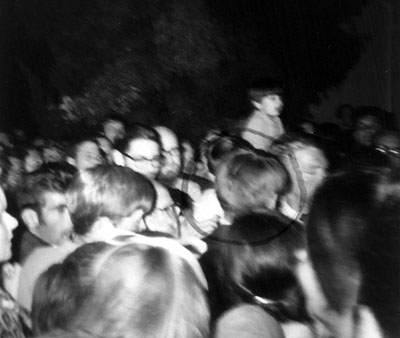 |
A Rapt Evening of May 1968By John CrandellAt 5:30 am the alarm woke me. That was the day that I was supposed to go fishing with my dad and his two brothers, the last chance I'd get to see them before entering boot camp. Then the radio news came up with word that Robert Kennedy was in grave condition. Once again, horror. As like my sister having been brutally slain nine months before. Instantly I intuited that I'd put a mark on him down the hill in Van Nuys as I'd reached through a fervid, screaming crowd at a campaign appearance. Such a macabre feeling, to sense down in your bones that you had set death in motion, that it was all your own fault. I didn't fish that day. Dad dropped me off on Broadway in downtown Los Angeles and I set out to try and find Good Samaritan Hospital.
Three weeks earlier, the junior senator from New York had appeared at Valley College. Every year since I've remembered the date — May 15th. And I was young and not yet a renegade Catholic. So I climbed over the rear fence in Sunland to convince Bill Linsley to come along. Kennedy was approaching the apex of his pitched battle with Eugene McCarthy. One year later I would be sleeping among rats at LZ Meredeth in the Central Highlands and still I could not have voted for him. You could go to war but couldn't handle a vote for democracy, whether or not you were young and devoted and came from the "light and space" of California. It was the month which saw the largest conscription and the largest American body count of the entire Vietnam venture. We left early but to no avail, the place was tightly packed two hours in advance. Youngsters were running from door to door of the men's gymnasium pounding in vain, pleading for admittance. Outside speakers were set up so others could hear the candidate's address. Music performed by the Strawberry Alarm Clock was broadcast, along with Richard Harris' surreal rendering of Jimmy Webb's McArthur Park, the tune which would come to haunt LA in future decades. After standing and waiting for so long we finally heard a tremendous roar of voices coming up Ethel Avenue north of Burbank Boulevard. So hundreds of us ran over to a high fence to see the star-crossed younger brother. The scene remains indelible: he up atop the back seat of an open convertible with a man in front holding a portable spotlight, the center of an emotional riot. People had swarmed out into the street and all over that convertible! Total bedlam. Young men began scrambling over ten feet of chain link to join the chase. My friend Bill stood back to avoid the stampede while I started to dodge and run along the fence towards an entry gate further north. Then I managed to collide with someone's ten-speed bike and so there I was, down on the ground tangled up in spokes and I glanced back at Linsley and for fifty years now, I've remembered him there amidst the swirl, bent over in convulsive laughter, stomping his foot on the ground. Then I got up and together we took off running across the volleyball courts towards the drive where the caravan would enter. We stood back as the car passed by, its fenders loaded with kids. Hundreds were running alongside and so many more came swarming across the courts. And it seemed as though everyone was yelling and screaming. I still think of that sole moment of spring as the most electrifying of my life. Over the speakers came an inordinate roar from inside the gym. So we ran back to the front door where we figured he would enter to speak; we were the first ones there. The car arrived and stopped a minute later and we were surrounded by a youthful mass of humanity. A woman fainted in the crush and was passed hand to hand above the tightly packed throng. From the rear came a chant "We want Gene! We want Gene!" But our crowd was decidedly partisan; the McCarthyites quickly shut up and ran for safety. Protected by a wedge of bodyguards, he didn't shake hands and they pressed forward through the pandemonium. I couldn't resist, lunged through the crowd and lightly touched his shoulder. Days earlier he'd been mobbed both in South and East LA. Kids had made off with his wingtip shoes and more than one pair of cufflinks. But on that night he spoke on foreign affairs and jokingly asked how many were actually able to vote for him. Not many of us could have. That evening he didn't quote Shaw and shook many hands in taking leave. Then the caravan rolled down the long drive — back towards Ethel — and I watched through the viewfinder of my camera as the car turned out and underneath the overpass which crosses there to the east. He suddenly bent forward with both hands clasped behind his head, down he went into the back seat. An LAPD officer had cleared the bridge only minutes before, yet someone was allowed to return and throw something from above. One thinks back to that calamitous point in one's life, sees the indescribable contrast to the crude, brazen reality of our present day and can't help but feel that the universe does not smile upon us. John Crandell is a US Army vet — CONARC, 4th Infantry & 1st Cavalry 1969-1970. He worked afterwards in various jobs in environmental design. Now retired, he is involved in product development and horticultural propagation at 'The Farm' outside of Sacramento, California.
|


